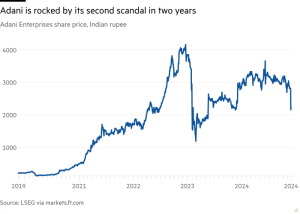Spanish growth soars as Eurozone stutters
Spain is set to surpass the US to become the world’s fastest-growing major advanced economy this year, expanding at more than three times the pace of the Eurozone as a whole.
Economists polled by forecasters Consensus Economics expect GDP data this week to show Spain is on course to grow 2.7 per cent this year, fuelled by a combination of immigration, tourism, foreign investment and public spending.
The IMF, which includes Spain alongside G7 states in its outlook for large advanced economies, is more bullish. The fund last week said it expects a 2.9 per cent expansion, slightly higher than the 2.8 per cent figure it predicted for the US.
The Eurozone’s fourth-largest economy is leading a divergence that has become the region’s most marked economic trend this year. The region’s biggest economy, Germany, and other richer, northern countries, such as the Netherlands, have struggled to grow. Meanwhile, traditionally weaker, southern states, such as Spain and Greece, have performed well.
Spain’s third-quarter GDP figures are out on Wednesday morning, shortly before data for the region as a whole.
Opposition politicians in Spain and some economists say there is a flipside to the country’s growth story, noting GDP per capita is growing more slowly than headline GDP.
This is partly because 700,000 working-age immigrants have entered the workforce over the past three years, according to Funcas, a savings bank foundation. They have helped to lift its overall population from 47.4mn to nearly 49mn, but many are employed in low-skilled, low-paid jobs.
At the same time critics of the Socialist-led government say too many Spanish families are struggling with the high cost of living and that too little has been done to alleviate acute shortages of affordable housing.
Spain’s headline growth is forecast to slow to 2.1 per cent next year, but its strength remains a fillip for Prime Minister Pedro Sánchez, who is eager to claim credit and bolster the country’s international standing.
“I can say that Spain is living an extraordinary moment,” he said last week. “Our country is experiencing great success.”
Although Spain’s economy was slower to recover from the impact of Covid-19 than many of its peers, it is now 5.7 per cent bigger than it was in 2019 while the Eurozone as a whole has expanded by 4.2 per cent.
Funcas estimates increased government consumption — including pandemic-related support and public-sector jobs — accounted for 59 per cent of that growth.
Juan Bravo, economy chief for the opposition People’s Party, said: “When growth is based on public spending that you can’t maintain in a country with a high debt-to-GDP ratio, somebody should be concerned.” Spanish government debt is equal to 102 per cent of GDP, according to the IMF.
Investors, however, are not perturbed. In the sovereign bond market, the gap between the yields on Spanish and German government debt — a measure of how much riskier Spain is seen as — is at its lowest level since January 2022.
FT Edit
This article was featured in FT Edit, a daily selection of eight stories to inform, inspire and delight, free to read for 30 days. Explore FT Edit here ➼
Spain’s 10-year bond yield, now 2.98 per cent, has fallen below France’s. Richard McGuire, head of rates strategy for Rabobank, said that partly reflected France’s yawning budget deficit, which is set to hit 6.1 per cent this year, as well as Spain’s “positive fundamental performance”.
Tourism, a pillar of Spain’s economy, explains part of its growth with the country on course to beat last year’s record of 85mn visitors. But Carlos Cuerpo, economy minister, has stressed the exports of services other than tourism are growing faster.
While tourism is expected to generate €90bn of income in Spain’s balance of payments in 2024, other services exports are set to generate €100bn, Cuerpo said last week. They include activities for overseas clients ranging from banking to engineering services to IT consulting as well as universities that host international students.
Spain has also been the world’s sixth-largest destination for foreign direct investment projects since 2019, according to fDi Markets, a Financial Times-owned database that tracks greenfield announcements. In the renewable energy sector, one of the country’s forte’s, it secured 77 new projects last year, ranking joint first globally with the US.
But Raymond Torres, director for macroeconomic analysis at Funcas, noted investment overall — as measured by gross fixed capital formation — is barely rising. The reason, he suggested, was that many Spanish companies have a bleaker view of the country — and its fractured politics — than foreign counterparts.
“In comparative terms globally, Spain is not badly placed,” Torres said. “But of course a Spanish investor, especially a small company, doesn’t think about the international comparison. He reasons according to his own vision of things and perceives much more directly all the political uncertainties.”
Although Spain’s unemployment rate of 11.2 per cent is still high, it boasted a record 21.8mn people in employment in the third quarter of this year. Funcas calculates that over the past three years immigrants have filled 40 per cent of all new jobs created.
Adrian Prettejohn, an economist at Capital Economics, said higher immigration had “ensured that labour has not been as significant a constraint on production as it has been elsewhere in the Eurozone”, helping businesses to keep a lid on wage growth but also boosting individual consumption.
However, the largest numbers of immigrants are working in sectors such as agriculture, hospitality or construction, where worker productivity is low.
Ignacio de la Torre, chief economist at investment bank Arcano, said Spain’s reliance on immigration meant it was experiencing “quantity growth” driven by job-filling rather than quality growth.
“Quality growth would imply an increase in productivity that would lead to an increase in GDP per capita and hence a better standard of living,” he said. “Germans are more productive than Spaniards, they have more income, so they live better and can work fewer hours.”
Additional reporting by Carmen Muela in Madrid
#Spanish #growth #soars #Eurozone #stutters











